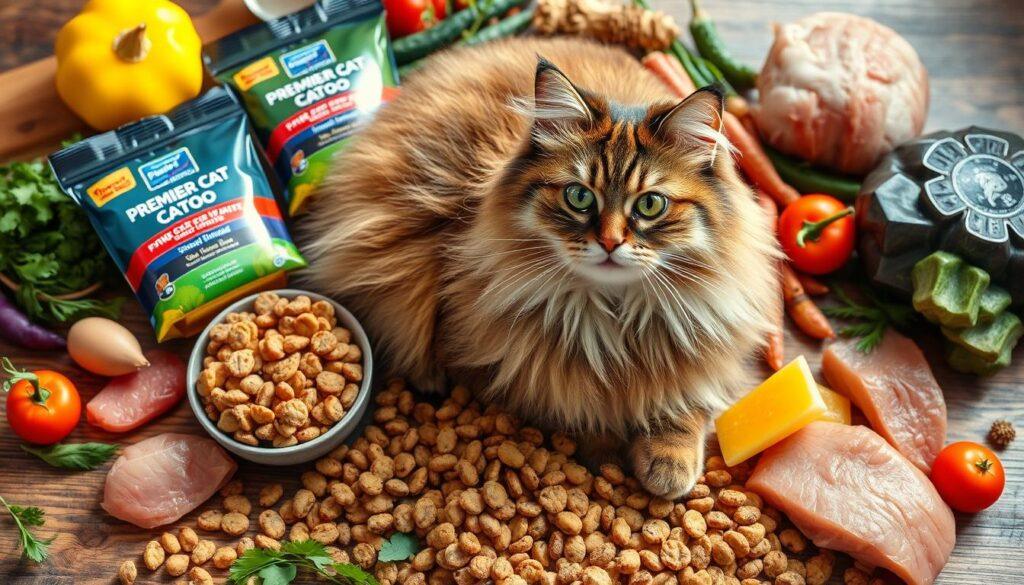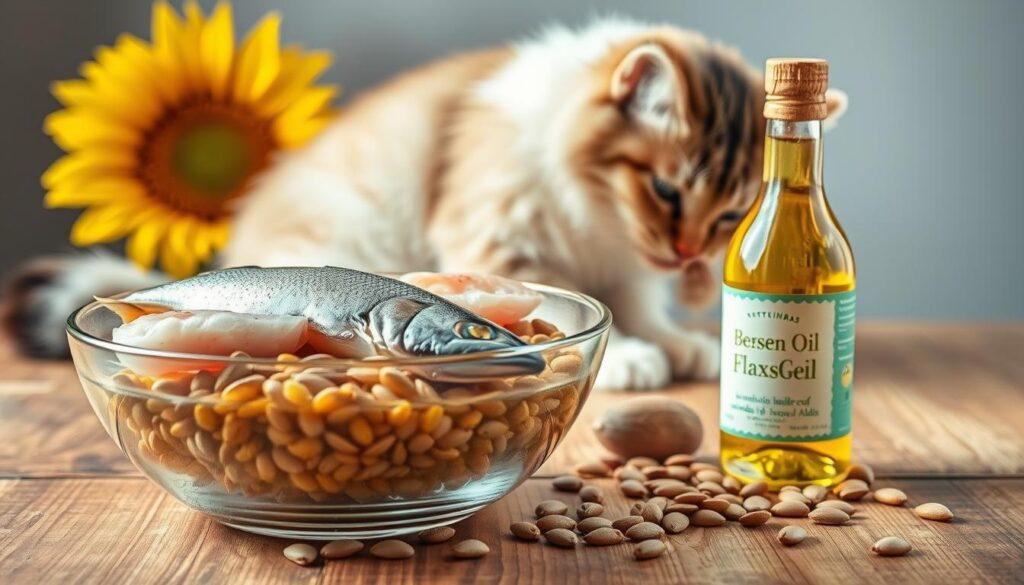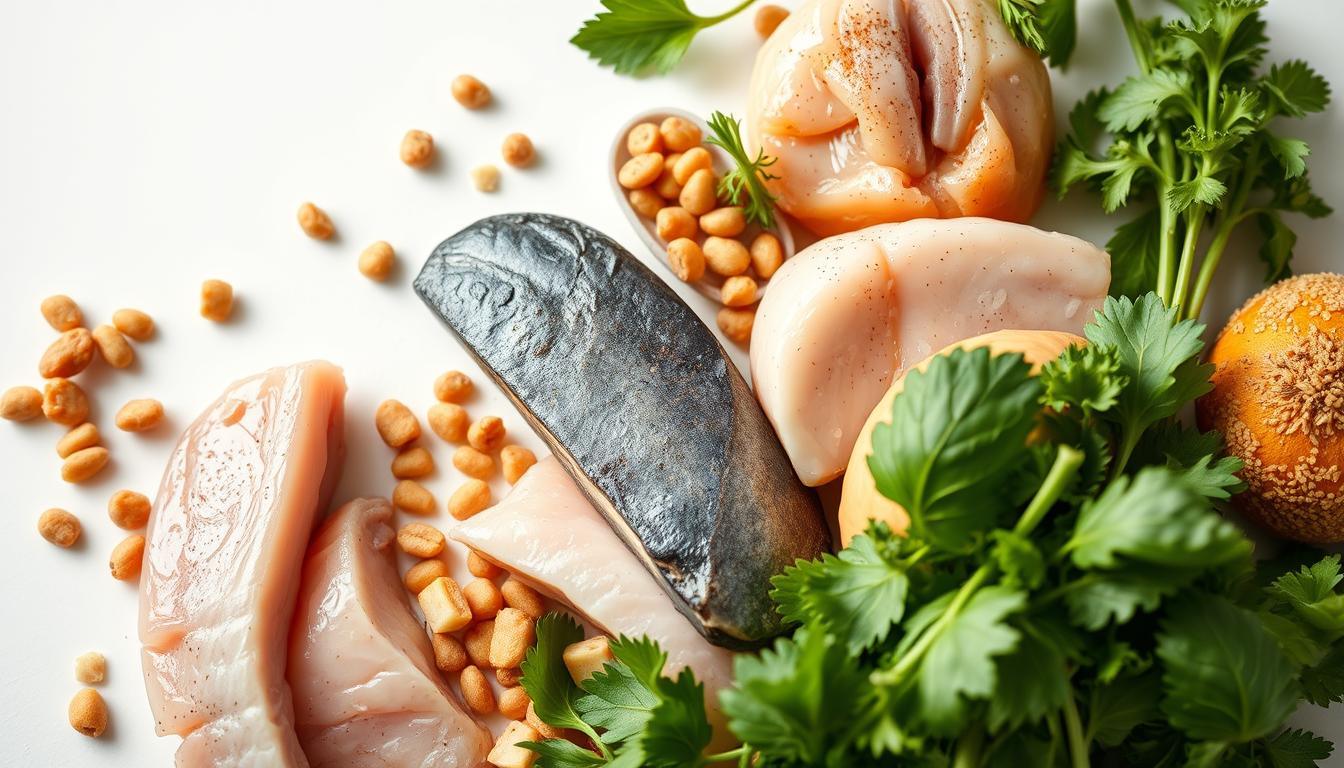Did you know an average cat has about 70 million hairs1? Cat hair loss can be a big problem for pet owners. But, the right food can help keep their coat healthy and reduce shedding. This guide will show you the best foods for cats with hair loss and how to keep their fur in top shape.
Cats shed twice a year in the wild, but indoor cats shed all year1. Excessive hair loss might mean they’re not getting the right nutrients. By choosing nutrient-rich cat food, you can help your cat have a shiny, thick coat.
Hairballs are common because cats groom themselves a lot12. Foods high in protein can help prevent hairballs and keep the coat healthy. Look for brands like Purina ONE and Royal Canin, which offer the right balance of protein, fat, and fiber for your cat’s health2.
Key Takeaways
- Proper nutrition is essential for maintaining a healthy coat and reducing excessive shedding in cats
- High-quality protein sources with a biological value over 90% benefit a cat’s skin and coat
- Cats’ diets should contain more than 50% animal protein and up to 20% fat for reducing shedding
- Hairball prevention cat food formulas can help minimize hairball formation and promote digestive health
- Regular grooming and stress management are also important factors in maintaining a healthy coat
Understanding Cat Hair Loss and Shedding
Shedding is normal for cats, except for hairless breeds3. Outdoor cats shed twice a year, while indoor cats can shed anytime. Sunlight, hormones, genetics, and diet affect how much they shed4. Healthy cats should shed little, with a shiny coat4.
Normal Shedding Patterns in Cats
Cats shed differently based on their breed and fur3. Some shed more in spring and autumn, while others shed all year. Brushing and grooming can help manage shedding3.
Signs of Excessive Hair Loss
Too much hair loss can mean a health problem. Cats with dull coats, bald spots, or rashes might be sick3. Look out for excessive grooming, hairballs, and vomiting3. If your cat’s grooming changes or they have bald spots, see a vet3.

Common Causes of Hair Loss in Cats
Cats shed too much for many reasons, like allergies, parasites, or stress4. Ringworm, a fungal infection, is common in kittens or group-living cats5. Cats with skin damage are more likely to get ringworm5.
Diet is key for a healthy coat. Low-quality protein can cause thin, brittle hair5. Cats need animal proteins for hair growth, not plant proteins4. They use 30% of their daily protein for skin renewal5.
Vets use tests like blood work and skin scrapes to find the cause of shedding4. A balanced diet with vitamins A and E helps a healthy coat5. Raw food diets improve skin and coat health, reducing shedding4. Switching to raw food can improve a cat’s coat in weeks4.
Importance of Diet in Maintaining Healthy Fur
A balanced diet is key for your cat’s skin and fur. It gives them the nutrients they need for strong, shiny fur. It also helps prevent too much shedding.
Role of Protein in Cat Coat Health
Protein is vital for a cat’s diet. It helps make keratin, which is important for hair and nails6. Kittens need at least 30% protein, while adult cats need 26% or more7. Foods like chicken, turkey, or fish are good sources of protein for cats6.
Essential Fatty Acids for Skin and Fur
Essential fatty acids, especially omega-3, are crucial for skin health in cats6. They help keep the skin hydrated and reduce inflammation. Fish oil supplements can make your cat’s coat soft and shiny, reducing shedding.
Omega-3 and omega-6 fatty acids work together for skin health. Here’s a table showing their benefits:
| Fatty Acid | Benefits | Sources |
|---|---|---|
| Omega-3 | Reduces inflammation, improves skin hydration | Fish oil, flaxseed oil |
| Omega-6 | Maintains skin barrier function, promotes wound healing | Poultry fat, vegetable oils |
Vitamins and Minerals that Support Coat Condition
Vitamins and minerals are also important for your cat’s skin and fur. Vitamin A helps with skin growth, and a lack of it can cause skin problems7. Antioxidants like vitamin C and E protect skin cells6. Zinc helps with skin health and metabolism6.

Biotin prevents keratin overgrowth, and niacin helps avoid skin problems7. Choose cat food with a mix of vitamins and minerals for your cat’s health. Your vet might suggest supplements for shedding issues.
Best Food for Cat Hair Loss
Choosing the right food for your cat’s hair loss is important. Look for foods with high-quality protein, omega fatty acids, and hairball control formulas. These can help keep your cat’s fur healthy and reduce shedding.
High-Quality Protein Sources
Protein is key for a cat’s coat health. Choose foods with animal proteins like chicken, fish, and eggs. These are easy for cats to digest and support strong fur. Make sure the protein content is at least 45% on a dry matter basis8.
Omega-3 and Omega-6 Fatty Acid Supplementation
Omega-3 and omega-6 fatty acids are crucial for skin and coat health. Find them in fish oil and wild-caught fish. Choose a cat food with a balanced mix of these fatty acids. Aim for a fat content of 25-35% on a dry matter basis to reduce shedding8.
Switching to a new diet may take about a month to show results8. Be patient and consistent when changing your cat’s food to see improvements in their coat.
Specialized Hairball Control Formulas
Cats with hair loss may need special hairball control formulas. These diets help pass hair through the digestive system, preventing hairballs. They often include fiber, omega fatty acids, and digestive aids for healthy digestion and less hairball formation.
Choosing the right food for your cat’s hair loss depends on their needs and preferences. Some cats may have allergies or sensitivities. Always consult with your vet to find the best diet for your cat. Common causes of hair loss in include pregnancy, parasites, allergies, infections, stress, hormonal imbalances, poor nutrition, genetics, and severe health conditions9.
Feed your cat a balanced diet with high-quality protein, omega fatty acids, and special formulas when needed. Regular grooming and stress management also help keep their coat healthy9.
Other Factors Affecting Cat Coat Health
A balanced diet is key for a healthy cat coat. But other factors also matter. Regular grooming, managing stress, and fixing health problems help prevent too much shedding. They also make the coat shiny and healthy.
Regular Grooming and Brushing
Regular grooming and brushing are vital. They remove loose hair and spread natural oils. This keeps the coat healthy and shiny, especially for older cats.
Senior cats may need more brushing because they can’t groom as well. Brushing them often helps their skin and coat stay healthy10. But, bathing them too much can dry out their skin. So, bathe them only when really needed, and use a conditioning rinse10.
Using natural remedies like omega-3 fatty acids can also help older cats’ skin and coat10. About 25% of cat vet visits are for skin and haircoat problems11. So, it’s important to catch any issues early.
Stress Management for Cats
Stress and anxiety can cause cats to groom too much and shed more. A calm, enriching environment helps. Give them hiding spots, perches, and toys to keep them happy and less stressed.
Watching your cat’s weight is also crucial. Overweight cats can’t groom well and may get dandruff. About 57% of U.S. cats are overweight or obese10. Excess weight can lead to serious health problems like diabetes and heart disease10.
Quick weight loss in overweight cats can cause liver disease. So, work with your vet to safely help your cat lose weight10.
If your cat’s coat looks better after diet or lifestyle changes, talk to your vet. They can help find any health issues10.
Conclusion
To keep your cat’s coat healthy and reduce hair loss, you need a few steps. Start with a diet full of animal protein, fatty acids, vitamins, and minerals. This helps their skin and fur stay in top shape. About 30% of a cat’s daily protein goes to skin renewal, which is key for hair health12.
When picking the best food for cat hair loss, look for foods rich in vitamins A, E, B, and hydrolyzed proteins. These help keep their skin and coat healthy12.
Finding and fixing the reasons for hair loss is important. Common causes include parasites, allergies, infections, stress, and poor nutrition13. To treat parasites, use products like Fipronil (Frontline Plus), Imidacloprid (Advantage), and Selamectin (Stronghold/Revolution)12.
For hair loss from food allergies, try hypoallergenic cat food. This might include lamb, duck, or venison diets1312.
Regular grooming and managing stress are also key. Addressing health issues is part of a good plan for cat hair loss. Diet, essential oils, stress reduction, herbal remedies, and natural treatments can help13.
Behavioral changes and stress removal are important for psychogenic alopecia in cats12. By giving your cat the best food and care, you can help them have a shiny coat and less shedding. Hair regrowth can take a few months12.
In summary, fighting cat hair loss needs a mix of good food, addressing health issues, and regular grooming. With the right care, your cat’s coat will be healthy and shiny. A healthy coat shows a happy, well-cared-for cat.
FAQ
What are the common causes of excessive hair loss in cats?
What role does diet play in maintaining a healthy coat for cats?
What should I look for when choosing the best food for cat hair loss?
Besides diet, what other factors can affect a cat’s coat health?
How can I tell if my cat is shedding excessively or experiencing hair loss?
Source Links
- What is the best cat food for shedding? – https://untamed.com/blogs/nutrition/best-cat-food-for-shedding
- 9 Best Cat Foods for Shedding & Hair Loss in 2024: Reviews & Top Picks – Catster – https://www.catster.com/nutrition/best-cat-foods-for-shedding-hair-loss/
- 8 Ways to Reduce Cat Shedding | Bond Vet – https://bondvet.com/b/ways-to-reduce-cat-shedding
- Feline Nutrition – Answers: What Dry Food Does to Your Cat’s Fur – https://hare-today.com/feline-nutrition/answers/answers-what-dry-food-does-to-your-cat-s-fur
- Cat Hair Loss – My Cat Is Losing Hair – https://www.royalcanin.com/us/cats/health-and-wellbeing/my-cat-is-losing-its-hair
- The Connection Between Diet and Your Cat’s Healthy Skin – https://petwellbeing.com/blogs/news/the-connection-between-diet-and-your-cats-healthy-skin?srsltid=AfmBOop07nu5CnIdhU4r7jtg31p7lont0dbcMkH7yZcZKq62NYl_JQSP
- Healthy Cat Fur relies on a good cat diet and cat care – https://www.cat-health-detective.com/healthy-cat-fur.html
- How to Stop a Cat from Shedding with Diet Changes – https://www.petmd.com/blogs/nutritionnuggets/cat/dr-coates/2014/may/if-cat-shedding-lot-try-different-food-31616
- Home Treatment for Cat Hair Loss [Top 4 Effective Methods] – HolistaPet – https://www.holistapet.com/blogs/home-remedies-for-cats/treatment-for-hair-loss?srsltid=AfmBOoqItHg89MN9KhIK_mhcjtuvx3xryecRgV29HS4HgHOnKXB5IKRh
- Cat Coat Care: How to Keep Your Cat’s Coat Shiny – https://www.webmd.com/pets/cats/features/cat-nutrition-for-a-healthy-coat
- Nutrition, Skin, and Cats | VCA Animal Hospitals – https://vcahospitals.com/know-your-pet/nutrition-skin-and-cats
- Common Cat Hair Loss Treatments and Remedies – https://www.petcubes.com/blogs/cat-losing-hair/cat-hair-loss-treatments?srsltid=AfmBOopeRJdLHy76KFQAtoyykhsKm_D44UTl0zBqCMFH3P8eH5MQL0ex
- Home Treatment for Cat Hair Loss [Top 4 Effective Methods] – HolistaPet – https://www.holistapet.com/blogs/home-remedies-for-cats/treatment-for-hair-loss?srsltid=AfmBOopUJV8VceQcg0nK-nq623tS632evOSIOYDFuVUia4xKEh__JNoR


